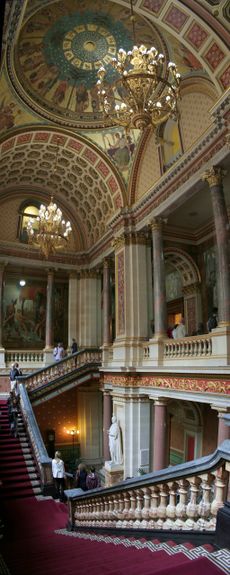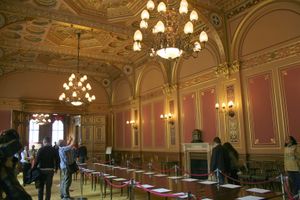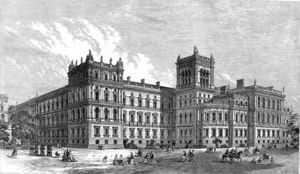وزارة الخارجية والكومنولث البريطانية
 | |
 The Foreign and Commonwealth Office, Whitehall, لندن | |
| استعراض وزارة | |
|---|---|
| تشكلت | 1968 |
| الوكالات السابقة | |
| الاختصاص | المملكة المتحدة |
| المقر الرئيسي | FCO Main Building, King Charles Street, لندن 51°30′09″N 0°07′39.7″W / 51.50250°N 0.127694°W |
| الميزانية السنوية | 1.5 بليون استرليني (جاري) و 100 مليون استرليني (رأسمال) في 2011-12 [1] |
| الوزير المسئول | |
| تنفيذي وزارة |
|
| الوكالات الفرعية |
|
| الموقع الإلكتروني | www |
| المملكة المتحدة |
 هذه المقالة هي جزء من سلسلة: |
|
|
|
القضاء
السياسة الخارجية
|
|
دول أخرى • أطلس بوابة السياسة |
وزارة الخارجية والكومنولث Foreign and Commonwealth Office (واختصاره FCO)، ويشيع تسميته مكتب الخارجية Foreign Office، هو وزارة في حكومة المملكة المتحدة. وهي مسؤولة عن حماية وترويج مصالح المملكة المتحدة في أرجاء العالم. وقد أنشئت في 1968 بدمج وزارة الخارجية ومكتب الكومنولث.
رأس الـ FCO هو وزير الدولة لشؤون الخارجية والكومنولث، والذي يشيع اختصاره إلى "وزير الخارجية" (حالياً وليام هيگ). ويُعتبر هذا المنصب أحد أهم المناصب الأربعة المرموقة في الحكومة، مع وزير الخزانة ووزير الداخلية. ومع رئيس الوزراء، يشكل هؤلاء المناصب الكبرى بالدولة.
الشؤون اليومية لوزارة الخارجية يديرها موظف عمومي، Permanent Under-Secretary of State for Foreign Affairs، الذي يترأس أيضاً السلك الدبلوماسي. هذا المنصب يشغله سايمون فريزر منذ أواخر 2010.
. . . . . . . . . . . . . . . . . . . . . . . . . . . . . . . . . . . . . . . . . . . . . . . . . . . . . . . . . . . . . . . . . . . . . . . . . . . . . . . . . . . . . . . . . . . . . . . . . . . . . . . . . . . . . . . . . . . . . . . . . . . . . . . . . . . . . . . . . . . . . . . . . . . . . . . . . . . . . . . . . . . . . . . .
الوزراء
The FCO Ministers are as follows:[2]
| الوزير | الرتبة | الحقيبة | |
|---|---|---|---|
| المبجل وليام هيگ MP | وزير الدولة | Overall responsibility | |
| المبجلة سيدة وارسي | Senior Minister of State | Afghanistan, Pakistan, Bangladesh; Central Asia; Human Rights; UN, International Organisations and ICC; All of FCO business in the Lords[3] | |
| المبجل ديڤد لدنگتون MP | وزير الدولة Minister for Europe |
European Union (including Gibraltar and SBAs); Europe, including Balkans, Ukraine, Belarus and Moldova; Russia, South Caucasus,NATO and European Security; OSCE and Council of Europe; FCO relations with Parliament; Communications; FCO Finance; Estates and Security; Information and Technology[4] | |
| المبجل هوگو سواير MP | Minister of State | Far East and South East Asia; India and Nepal; Latin America (including: Dominican Republic, Haiti and Cuba); Falklands; Australasia and Pacific; Commonwealth[5] | |
| المبجل اللورد گرين من هرستپيرپوينت | وزير الدولة Minister of State for Trade and Investment |
Leading on FCO relations with British Business; Commercial Economic Diplomacy Department; Economics Unit; UK Trade and Investment (joint Minister with Dept. for Business, Innovation and Skills; Export Credits Guarantee Department (ECGD); Spokesman for the Government on trade and investment issues in the House of Lords; Business policy | |
| Mark Simmonds MP | Parliamentary Under-Secretary of State | Africa; Overseas Territories (not Falklands, SBAs or Gibraltar); Conflict Issues; Climate Change; International Energy; Consular; Protocol; Ministerial Oversight for FCO Services; The Caribbean (not including Dominican Republic, Haiti or Cuba) | |
| Hugh Robertson MP | Minister of State | Middle East and North Africa, North America, Counter Terrorism, Defence and International Security, Human Resources and Diversity, Olympic and Paralympic Legacy | |
| Key | Conservative |
|---|
William Hague is also First Secretary of State, which implies seniority over all other Secretaries of State.
Lord Green also works at the Department for Business, Innovation and Skills [6] and is lead minister on the Export Credits Guarantee Department (ECGD).
تاريخ الوزارة
وزارة الخارجية

- القرن الثامن عشر
The Foreign Office was formed in March 1782 by combining the Southern and Northern Departments of the Secretary of State, each of which covered both foreign and domestic affairs in their parts of the Kingdom. The two departments' foreign affairs responsibilities became the Foreign Office, whilst their domestic affairs responsibilities were assigned to the Home Office. The Home Office is technically the senior.[7]
- القرن التاسع عشر
During the 19th century, it was not infrequent for the Foreign Office to approach The Times newspaper and ask for continental intelligence, which was often superior to that conveyed by official sources.[8]
- القرن العشرون
أثناء الحرب العالمية الأولى أقيم المكتب العربي ضمن وزارة الخارجية البريطانية. وكان قسماً من قسم مخابرات القاهرة.
وزارة الخارجية والكومنولث
The FCO was formed in 1968, from the merger of the short-lived Commonwealth Office and the Foreign Office. The Commonwealth Office had been created only in 1966, by the merger of the Commonwealth Relations Office and the Colonial Office, and the Commonwealth Relations Office had been formed by the merger of the Dominions Office and the India Office in 1947—with the Dominions Office having been split from the Colonial Office in 1925.
The Foreign and Commonwealth Office held responsibility for international development issues between 1970 and 1974, and again between 1979 and 1997. From 1997, this became the responsibility of the separate Department for International Development.
The National Archives website contains a Government timeline to show the departments responsible for Foreign Affairs from 1945.[9]
التطورات
When David Miliband took over as Foreign Secretary in June 2007, he set in hand a review of the FCO’s strategic priorities. One of the key messages of these discussions was the conclusion that the existing framework of ten international strategic priorities, dating from 2003, was no longer appropriate. Although the framework had been useful in helping the FCO plan its work and allocate its resources, there was agreement that it needed a new framework to drive its work forward.
The new strategic framework consists of three core elements:
- A flexible global network of staff and offices, serving the whole of the UK Government.
- Three essential services that support the British economy, British nationals abroad and managed migration for Britain. These services are delivered through UK Trade & Investment (UKTI), consular teams in Britain and overseas, and the UK Border Agency (UKBA).
- أربعة أهداف لسياساتها:
- countering terrorism and weapons proliferation and their causes
- preventing and resolving conflict
- promoting a low carbon, high-growth, global economy
- developing effective international institutions, in particular the United Nations and the European Union.
In August 2005, a report by management consultant group Collinson Grant was made public by Andrew Mackinlay. The report severely criticised the FCO's management structure, noting:
- The Foreign Office could be "slow to act".
- Delegation is lacking within the management structure.
- Accountability was poor.
- The FCO could feasibly cut 1200 jobs.
- At least £48 million could be saved annually.
The Foreign Office commissioned the report to highlight areas which would help it achieve its pledge to reduce spending by £87 million over three years. In response to the report being made public, the Foreign Office stated it had already implemented the report's recommendations. [1]
In April 2006 a new executive agency was established, FCO Services, to provide corporate service functions. In April 2008 it moved to Trading Fund status so it had the ability to provide similar services which it already offers to the FCO, to other government departments and even outside businesses.
In 2009, Gordon Brown created the position of chief scientific adviser (CSA) to the FCO. The first science adviser was David C. Clary.[10]
On 25 April 2010, the department apologised after The Sunday Telegraph obtained a "foolish" document calling for the upcoming September visit of Pope Benedict XVI to be marked by the launch of "Benedict-branded" condoms, the opening of an abortion clinic and the blessing of a same-sex marriage.[11]
In 2012, the Foreign Office was criticised by Gerald Steinberg, of the Jerusalem-based research institute, NGO Monitor, saying that the Foreign Office and the Department for International Development to Palestinian NGOs provided more than £500,000 in funding to Palestinian NGOs which he says "promote political attacks on Israel." In response, a spokesman for the Foreign Office said, “we are very careful about who and what we fund. The objective of our funding is to support efforts to achieve a two-state solution. Funding a particular project for a limited period of time does not mean that we endorse every single action or public comment made by an NGO or by its employees.”[12]
In September 2012, the FCO and the Canadian Department of Foreign Affairs signed a Memorandum of Understanding on diplomatic cooperation, which promotes the co-location of embassies, the joint provision of consular services, and common crisis response. The project has been criticised for further diminishing the UK's influence in Europe.[13]
تاريخ المبنى الرئيسي لوزارة الخارجية
The Foreign and Commonwealth Office occupies a building which originally provided premises for four separate government departments: the Foreign Office, the India Office, the Colonial Office, and the Home Office. Construction on the building began in 1861 and finished in 1868, and it was designed by the architect George Gilbert Scott.[14] Its architecture is in the Italianate style; Scott had initially envisaged a Gothic design, but Lord Palmerston, then Prime Minister, insisted on a classical style.[14] English sculptors Henry Hugh Armstead and John Birnie Philip produced a number of allegorical figures ('Art', 'Law', 'Commerce', etc.) for the exterior.
في 1925، استضاف مكتب الخارجية توقيع معاهدات لوكارنو، التي هدفت إلى خفض التوتر في اوروپا. The ceremony took place in a suite of rooms that had been designed for banqueting, which subsequently became known as the Locarno Suite.[15] During the Second World War, the Locarno Suite's fine furnishings were removed or covered up, and it became home to a foreign office code-breaking department.[15]
Due to increasing numbers of staff, the offices became increasingly cramped and much of the fine Victorian interior was covered over—especially after الحرب العالمية الثانية. In the 1960s, demolition was proposed, as part of major redevelopment plan for the area drawn up by architect Sir Leslie Martin.[14] A subsequent public outcry prevented these proposals from ever being implemented. Instead, the Foreign Office became a Grade 1 listed building in 1970.[14] In 1978, the Home office moved to a new building, easing overcrowding.
With a new sense of the building's historical value, it underwent a 17-year, £100 million restoration process, completed in 1997.[14] The Locarno Suite, used as offices and storage since the Second World War, was fully restored for use in international conferences. The building is now open to the public each year over Open House Weekend. The Foreign and Commonwealth Office is now also the main tenant of the Old Admiralty Building, at the opposite end of Horse Guards Parade.
قائمة عقارات مقر وزارة الخارجية والكومنولث
- FCO Main Building, Whitehall, King Charles St, London (abbreviated to KCS by FCO staff)
- Old Admiralty Building, Whitehall, London (abbreviated to OAB by FCO staff)
- Hanslope Park, Hanslope, Milton Keynes (abbreviated to HSP by FCO staff). Location of FCO Services, HMGCC and Technical Security Department of the UK Secret Intelligence Service)
. . . . . . . . . . . . . . . . . . . . . . . . . . . . . . . . . . . . . . . . . . . . . . . . . . . . . . . . . . . . . . . . . . . . . . . . . . . . . . . . . . . . . . . . . . . . . . . . . . . . . . . . . . . . . . . . . . . . . . . . . . . . . . . . . . . . . . . . . . . . . . . . . . . . . . . . . . . . . . . . . . . . . . . .
الأيلولة
العلاقات الدولية are handled centrally from Westminster on behalf of the whole of Britain and its dependencies. However, the devolved administrations also maintain an overseas presence in the European Union, the USA and China alongside British diplomatic missions:
- Scotland House (Brussels)
- Wales House (Brussels)
- Office of the Northern Ireland Executive in Brussels
- Scottish Affairs Office (Washington DC)
- Welsh Assembly Government External Affairs Department (New York)
- Northern Ireland Bureau (Washington DC)
These offices aim to promote their regional economies and ensure that devolved interests are taken into account in British foreign policy. Ministers from devolved administrations can attend international negotiations when permitted by the British Government e.g. EU fisheries negotiations.[16]
UK and devolved administration ministers meet at approximately quarterly intervals through the Joint Ministerial Committee (Europe), chaired by the Foreign Secretary to "discuss matters bearing on devolved responsibilities that are under discussion within the European Union."
في الاعلام
The main building of the Foreign Office was featured a number of times in the ITV series Agatha Christie's Poirot, such as in the episode The Theft of the Royal Ruby .[17]
انظر أيضاً
- Secretary of State for Commonwealth Affairs
- Secretary of State for Commonwealth Relations
- Secretary of State for Dominion Affairs
- Her Majesty's Diplomatic Service
- List of heads of missions from the United Kingdom
- Department for International Development
- Stabilisation Unit
- List of diplomatic missions in the United Kingdom
- List of diplomatic missions of the United Kingdom
- Diplomacy
- Ambassador
- Court of St. James's (to which foreign ambassadors to Britain are accredited)
- Know Before You Go Campaign
الهامش
- ^ Budget 2011 (PDF). London: HM Treasury. 2011. p. 48. Retrieved 30 December 2011.
- ^ Cabinet Office List of Government Departments and Ministers: Foreign and Commonwealth Office
- ^ http://www.fco.gov.uk/en/about-us/who-we-are/our-ministers/baroness-warsi
- ^ http://www.fco.gov.uk/en/about-us/who-we-are/our-ministers/david-lidington
- ^ http://www.fco.gov.uk/en/about-us/who-we-are/our-ministers/hugo-swire
- ^ BIS Ministers: Lord Green
- ^ A brief history of the FCO Foreign and Commonwealth Office
- ^ Weller, Toni (June 2010). "The Victorian information age: nineteenth century answers to today's information policy questions?". History & Policy (in الإنگليزية). المملكة المتحدة: History & Policy. Retrieved 9 December 2010.
{{cite web}}: CS1 maint: unrecognized language (link) - ^ National Archives
- ^ Clary, David (2013-09-16). "A Scientist in the Foreign Office". Science & Diplomacy. 2 (3).
- ^ "Apology over Pope 'condom' memo". BBC News. 25 April 2010.
- ^ ‘Investigate UK funding of Palestinian NGOs'
- ^ Gaspers, Jan (November 2012). "At the Helm of a New Commonwealth Diplomatic Network: In the United Kingdom's Interest?". Retrieved 2012-11-26.
- ^ أ ب ت ث ج Foreign & Commonwealth Office History
- ^ أ ب Foreign & Commonwealth Office: Route
- ^ Scottish gains at Euro fish talks, Scottish Government, 16 December 2009
- ^ http://investigatingpoirot.blogspot.ch/2013/07/episode-by-episode-theft-of-royal-ruby.html
وصلات خارجية
- Official website
- FCO Blogs
- Britain in the EU (FCO)
- Official website of FCO Services (Executive Agency)
- Official FCO/Immigration Service website
- FCO Flickr site
- FCO YouTube site
- FCO Twitter directory listing department Twitter sites
- Know Before You Go Campaign Site
- Pages using gadget WikiMiniAtlas
- Articles with hatnote templates targeting a nonexistent page
- Missing redirects
- Articles containing ويلزية-language text
- Pages using Lang-xx templates
- Pages with empty portal template
- Official website different in Wikidata and Wikipedia
- Coordinates on Wikidata
- Ministerial departments of the United Kingdom Government
- العلاقات الخارجية للمملكة المتحدة
- وزارات شئون خارجية
- Italianate architecture in the United Kingdom
- Grade I listed government buildings
- Grade I listed buildings in London
- وزارة الخارجية والكومنولث البريطانية
- Ministries established in 1968
- George Gilbert Scott buildings
- تأسيسات 1968 في المملكة المتحدة
- داوننگ ستريت




